- Home
- Connie Willis
To Say Nothing of the Dog Page 10
To Say Nothing of the Dog Read online
Page 10
Cyril, apparently desiring to help, got off me and ambled over to sniff at the covered basket. I picked myself up, rescued the basket, and followed Terence down to the river.
Jabez was standing on the dock next to a large pile of luggage, his arms folded militantly. “They think I’m going to let them pack the boat before they pay,” he said to no one in particular, “but Jabez has seen that trick before.” He thrust an impressively dirty hand under my nose. “Farnsecks.”
I had no more idea of what “farnsecks” was than “noinbob.” “Here,” I said, handing Terence my purse, “you settle up with him, and I’ll fetch the rest of the luggage.”
I gathered up the portmanteau and the satchel, which had been knocked halfway up the steps when Cyril hit me, and took them down to the dock, Cyril waddling amiably along beside me.
Terence was standing in the boat, which was a peeling dark green and had Victory stencilled on its prow. It was battered-looking but large, which was a good thing, since the pile of luggage on the dock turned out to be Terence’s.
“A beauty, isn’t she?” Terence said, taking the portmanteau from me and stowing it under the middle seat. “We’ll have her loaded and be on the river in no time.”
It took somewhat longer than that. We stowed Terence’s luggage, which consisted of a large Gladstone bag, two bandboxes, a valise, three hampers, a wooden crate, a tin box, a roll of rugs, and two fishing poles, in the prow, and mine in the stern, which completely filled the boat, so that we had to pull it all out and start again.
“We need to go at this scientifically,” Terence said. “Large items first, then fill in with the smaller.”
We did, starting with the Gladstone and ending with the rugs which we unrolled and crammed into corners. This time there was a space approximately a foot wide in the middle. Cyril immediately came over and lay down in it.
I felt I should volunteer to leave some of my bags behind, but as I had no idea what was in them, I decided I’d better not.
“I knew I should have brought Dawson,” Terence said. “Dawson’s a wonder at packing.”
I assumed that Dawson was his valet. Then again, it might be his pet raccoon.
“When I came up to Oxford, he managed to fit all Cyril’s and my earthly possessions in a single trunk with room left over. Of course, if he were here, there’d be his luggage to consider. And him.” He looked speculatively at the luggage. “Perhaps if we started with the smallest first—”
Eventually I suggested we tip Jabez an additional noinbob (whatever that was) and have him try. He did, jamming and mashing things in by brute force, and keeping up a running monologue. “Keep Jabez waiting half the day for his money,” he muttered, cramming the satchel under a seat, “and then expect him to pack the boat, as if he was a common servant. And then stand there watching Jabez like a pair of fools.”
We were. At any rate I was. Watching him with a sort of sick fascination. He had apparently not had the fierceness and tenacity bred out of him. I hoped there was nothing fragile in any of the boxes. Cyril, evicted from the boat, had gone back to sniffing at the covered basket, which must contain food. Terence pulled out his pocket watch and asked Jabez if he couldn’t go faster, which seemed to me extremely unwise.
“Faster, he says,” Jabez said, smashing in the side of Terence’s bandbox. “If they hadn’t brought along everything they own, it wouldn’t take this long. You’d think they were going to find the sources of the Nile. Serve ’em right if she sinks.”
Jabez finally succeeded, after much dark muttering and some denting of the valise, to get everything stowed. It wasn’t scientific, and the pile in the prow looked like it might topple over at any moment, but there was space for the three of us.
“Right on schedule,” Terence said, snapping his watch shut and stepping into the boat. “Avast, mateys, we’re off. Step lively now.”
Cyril ambled into the boat, lay down on the boards, and went to sleep.
“Ahoy, Ned,” Terence said. “Time to shove off.”
I started for the boat, and Jabez stepped in front of me, his hand outstretched for a tip. I gave him a shilling, which was apparently too much. He broke into a snaggled smile and stepped back immediately, and I climbed into the boat.
“Welcome aboard,” Terence said. “This first bit’s rather tricky to navigate. You row to start, and I’ll be cox.”
I nodded and sat down at the oars, looking dubiously at them. I’d rowed some at school, but only with automatically coordinated supraskims. These oars were wooden and weighed a ton. And they didn’t appear to have any linkage. When I tried to move them together, one hit the water with a flat splash, and the other didn’t even make contact with it.
“Sorry,” I said, trying again. “I haven’t done much rowing since my illness.”
“It will come back to you,” Terence said cheerily. “It’s like riding a horse.”
The second time I got both oars in the water, and could hardly get them out again. I gave a mighty pull, as if I were lifting roof beams in Coventry Cathedral, and sent a fountain of water over everything in the boat.
“Pair of fools!” Jabez said to no one in particular. “Never been in a boat before. They’ll be drowned before they get to Iffley, and what’ll become of Jabez’s boat then?”
“I say, I’d better row to start,” Terence said, scrambling over to change places with me, “and you be cox.” He took the oars and lowered them expertly into the water together and out again with scarcely a splash. “Just till we’re through this tricky bit.”
This tricky bit was the bridge, and then a veritable forest of skiffs, punts, rowboats, and two large yellow-and-red-painted barges. Terence rowed energetically past them, shouting orders to me to pull the tiller lines straight, which I was trying to do, but the boat seemed to have something of the same tendency as Cyril and kept canting to the left.
In spite of my best efforts, we were drifting steadily sideways toward some willows and a wall.
“Hold her to starboard,” Terence shouted, “to starboard!”
I had no idea what starboard was, but I pulled experimentally on the tiller lines until the boat more or less straightened, and by that time we were past the boats and opposite a wide grassy field.
It took me a moment to realize the field was Christ Church Meadow, though not the one I knew. No dozers, no scaffolding, no billowing sheets of plastic. No cathedral rising up out of heaps of red sandstone and mortar and roof slates. No workmen shouting orders to the robot masons. No Lady Schrapnell shouting orders at the workmen. No pickets protesting the ruination of the environment, education, the skyline of Oxford, and things in general.
A trio of cows were placidly chewing their cuds where the west tower and its spire now stood, swathed in blue plastic and waiting for Lady Schrapnell and the Coventry City Council to complete the bell negotiations.
A dirt path led past them, and, halfway up it, two dons strolled toward Christ Church’s honey-colored walls, their heads bent together, discussing philosophy or the poems of Xenophon.
I wondered again how Lady Schrapnell had managed to talk them into letting her build there. Back in the Nineteenth Century, the city had tried for thirty years to build a mere road across Christ Church Meadow before it finally lost to the university, and later, when the tube came to Oxford, the outcry at the mention of a tube station there had been even greater.
But temporal physics had reached a point in its research where it couldn’t go anywhere without building a nuclear-powered fine-structure oscillator. And there was no money to be gotten from the multinationals, who’d lost interest in time travel forty years ago, when they found out they couldn’t rape and pillage the past. No money for buildings, either, or for fellowships or salaries. No money, period. And Lady Schrapnell was an extremely determined woman and extremely rich. And she had threatened to give the money to Cambridge.
“No, no,” Terence said, “you’re steering us into the bank!”
I hastily
pulled on the lines and we headed back out into the current.
Ahead lay the college boathouses and the green-arched mouth of the Cherwell, and beyond that the gray tower of Magdalen and the long sweep of the Thames. The sky overhead was a gauzy blue, and, ahead, piled white clouds caught the sun. Near the far bank there were water lilies, and between them the water was a deep, clear brown, like the Waterhouse nymph’s eyes.
“‘Dark brown is the river,’” I quoted,“‘golden is the sand,’” and then hoped that had been written before 1888.
“‘It flows along forever, with trees on either hand,’” Terence said, so apparently it had.
“Although actually it doesn’t,” Terence said. “After this next bit it’s mostly all fields till Iffley. It doesn’t flow along forever, either, of course, only as far as London. That’s the thing about poetry, it’s scarcely ever accurate. Take the Lady of Shalott. ‘She loosed the chain and down she lay; The broad stream bore her far away.’ She lies down in the boat and goes floating down to Camelot, which couldn’t possibly happen. I mean, one can’t steer lying down, can one? She’d have ended up stuck in the reeds a quarter of a mile out. I mean, Cyril and I always have trouble keeping the boat headed in a straight line, and we’re not lying down in the bottom of the boat where one can’t see anything, are we?”
He was right. As a matter of fact, we were drifting directly toward the bank again, which here was overhung by spreading chestnuts with spreading dark-green leaves.
“Turn it to starboard,” Terence said impatiently.
I tugged on the lines, and the boat headed straight for a duck who’d built a floating nest out of sticks and chestnut leaves.
The duck squawked and flapped its wings.
“To starboard!” Terence said. “To the right!” He back-paddled furiously, and we missed the duck and headed back out toward the middle.
“I’ve never understood how a river works,” Terence said. “If one’s pipe or one’s hat falls in, even if it’s only a foot from shore, it goes bang into the current, straight out to sea, and round the Cape to India, which is probably what happened to poor Princess Arjumand. But in a boat, when one wants to be in the current, it’s all eddies and whirlpools and side currents, and one’s lucky if he doesn’t end up in the middle of the towpath. And even if the Lady of Shalott didn’t end up in the reeds, there’s the problem of the locks. To starboard, man! Starboard, not port!” He snapped his pocket watch open, looked at it, and began rowing even more energetically, shouting at me periodically to hold her to starboard.
But in spite of the boat’s unfortunate leftist leanings and the fact that I seemed to have signed on with Captain Bligh, I felt I could finally begin to relax.
I had met my contact, who was clearly very good—he had the role of Oxford undergraduate down perfectly—and we were on our way to Muchings End. Christ Church Meadow was an open field and Lady Schrapnell was a hundred and sixty years away.
I still couldn’t remember what it was I was supposed to do at Muchings End, but bits of it were coming back. I distinctly remembered Mr. Dunworthy saying, “as soon as it’s returned,” and telling Finch, “it’s a perfectly straightforward job,” and something about a nonsignificant object. I still couldn’t remember what the nonsignificant object I was supposed to return was, but it was obviously somewhere in that pile of luggage in the prow, and if all else failed I could leave it all at Muchings End. And presumably Terence knew. I’d ask him as soon as we were safely away from Oxford. We were obviously going to an appointment in Iffley, and possibly that was where I’d find out exactly what the plan was.
In the meantime, my job was to rest and recover from the ravages of time-lag and Lady Schrapnell and all those jumble sales, lean back and follow doctor’s orders and Cyril’s example. The bulldog had rolled over on his side and was snoring happily.
If the Victorian era was the perfect infirmary, the river was the perfect ward. The healing warmth of the sun on my neck, the soothing dip of the oars in the water, the restful scenery, green upon green upon green, the comforting drone of bees and Cyril’s snoring and Terence’s voice.
“Take Lancelot,” he was saying, apparently back on the subject of the Lady of Shalott. “Here he is in his armor and his helmet, riding along on his horse with his shield and lance, and he’s singing ‘Tirra-lirra.’ ‘Tirra lirra’! What sort of a song is that for a knight to be singing? ‘Tirra lirra.’ Still, though,” he said, pausing in his pull on the oars, “he did get the part about falling in love right, even though he made it a bit overdramatic, all that bit about ‘The web flew out and floated wide. The mirror crack’d from side to side.’ Do you believe in love at first sight, Ned?”
The image of the naiad, wringing out her sopping sleeve on Mr. Dunworthy’s carpet, rose unbidden before me, but that was clearly a side-effect of time-lag, the result of hormones out of balance, and so, very probably, was this. “No,” I said.
“Neither did I until yesterday,” Terence said, “or in Fate either. Professor Overforce says there’s no such thing, that it’s all accident and random chance, but if that’s so, why was she out on the river just at that spot? And why had Cyril and I decided to go boating instead of reading Appius Claudius? We were translating ‘Negotium populo romano melius quam otium committi,’ you see. ‘The Romans understand work better than leisure,’ and I thought, that’s exactly why the Roman Empire fell, they understood work better than leisure, and I certainly don’t want that to happen to the dear old British Empire, so off Cyril and I went and hired a boat and started up toward Godstow, and as we were passing through this wooded bit, I heard a voice so sweet it could have been a fairy’s calling ‘Princess Arjumand! Princess Arjumand!’ and I looked over at the bank, and there she was, the most beautiful creature I’d ever seen.”
“Princess Arjumand?” I said.
“No, no, a girl, dressed all in pink, with golden curls and a sweet, fair, beautiful face. Red cheeks and a mouth like a rosebud, and her nose! I mean, ‘She hath a lovely face’ simply doesn’t cover it, although what can one expect from someone who would go about on his horse singing, ‘Tirra-lirra’? I sat there, hanging onto the oars, afraid to move or speak for fear she was an angel or a spirit or something who would vanish at the sound of my voice, and just then she looked up and saw me and said, ‘O, sir, you haven’t seen a cat, have you?’
“And it was just like ‘The Lady of Shalott,’ only without the curse, and the mirrors breaking and flying about. That’s the thing with poetry, it tends to exaggerate. I hadn’t any inclination to lie down in the bottom of the boat and die of a broken heart at all. I rowed smartly in, hopped ashore, and asked her what sort of cat and where had she last seen it. She said, black with a white face and the dearest little white feet, and that it had gone missing two days before and she was afraid something had happened to it, and I said, never fear, that cats have nine lives. And just then a chaperone person who turned out to be her cousin came along and told her she shouldn’t talk to strangers, and she said, ‘O, but this young man has kindly offered to help me,’ and her cousin said, ‘That’s very good of you, Mr.—?’ and I said St. Trewes, and she said, ‘How do you do? I am Miss Brown and this is Miss Mering,’ and then she turned to her and said, ‘Tossie, I’m afraid we must be going. We shall be late for tea.’ Tossie! Have you ever heard such a beautiful name? ‘O name forever sweet! forever dear! The sound of it is precious to mine ear!’ Tossie!” he said rapturously.
Tossie? “Then who’s Princess Arjumand?” I said.
“Her cat. It’s named after the Indian maharani they named the Taj Mahal after, though one would think it would be called the Taj Arjumand in that case. Her father was out in India, the Mutiny and Rajahs and never the twain shall meet and all that.”
I was still lost. “Princess Arjumand’s father?”
“No. Miss Mering’s father, Colonel Mering. He was a colonel in the Raj, but now he collects fish.”
I didn’t even ask what “collecting f
ish” was.
“At any rate, the cousin said they had to be going, and Toss—Miss Mering said, ‘O, I do hope we meet again, Mr. St. Trewes. We are going tomorrow afternoon to see the Norman church at Iffley at two o’clock,’ and her cousin said, ‘Tossie!’ and Miss Mering said she was only telling me in case I found Princess Arjumand, and I said I would search most diligently, and I did, I went up and down the river with Cyril, calling ‘Puss, puss!’ all last night and this morning.”
“With Cyril?” I said, wondering if a bulldog was the best searcher under the circumstances.
“He’s nearly as good as a bloodhound,” he said. “That’s what we were doing when we ran into Professor Peddick and he sent us along to meet his antique relatives.”
“But you didn’t find the cat?”
“No, and not likely to, either, this far from Muchings End. I’d assumed Miss Mering lived near Oxford, but it turns out she’s only visiting.”
“Muchings End?” I said.
“It’s downriver. Near Henley. Her mother’d brought her up to Oxford to consult a medium—”
“A medium?” I said weakly.
“Yes, you know, one of those persons who tips tables and dresses up in cheesecloth with flour on her face to tell you your uncle’s very happy in the afterlife and his will’s in the top left-hand drawer of the sideboard. I’ve never believed in them myself, but then again, I’ve never believed in Fate either. And that’s what it must have been. My meeting Miss Mering, and your being on the railway platform and her telling me she and her cousin were to go to Iffley this afternoon.
“Only I hadn’t enough money for the boat, which is why it must be Fate. I mean, what if you hadn’t wanted to go on the river and hadn’t had the cost of Jabez? We shouldn’t be going to meet her at Iffley right now, and I might never have seen her again. At any rate, these mediums are apparently very good at finding missing cats as well as wills, so they came up to Oxford for a seance. But the spirits didn’t know where Princess Arjumand was either, and Miss Mering thought it might have followed her up from Muchings End, which didn’t seem very likely. I mean, a dog might follow one, but cats—”

 Passage
Passage Bellwether
Bellwether Blackout
Blackout Doomsday Book
Doomsday Book A Lot Like Christmas: Stories
A Lot Like Christmas: Stories Water Witch
Water Witch To Say Nothing of the Dog
To Say Nothing of the Dog Fire Watch
Fire Watch The Winds of Marble Arch and Other Stories
The Winds of Marble Arch and Other Stories Uncharted Territory
Uncharted Territory All Clear
All Clear Crosstalk
Crosstalk Lincoln's Dreams
Lincoln's Dreams Miracle and Other Christmas Stories
Miracle and Other Christmas Stories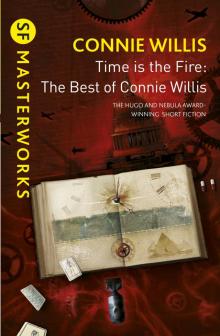 Time is the Fire
Time is the Fire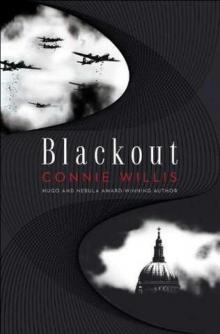 Blackout ac-1
Blackout ac-1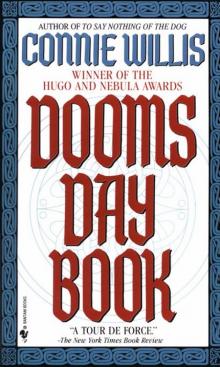 Dooms Day Book
Dooms Day Book Jack
Jack The Doomsday Book
The Doomsday Book Terra Incognita
Terra Incognita The Best of Connie Willis
The Best of Connie Willis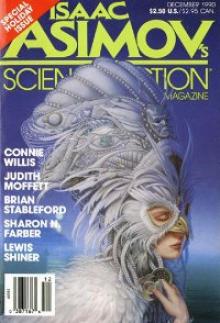 Cibola
Cibola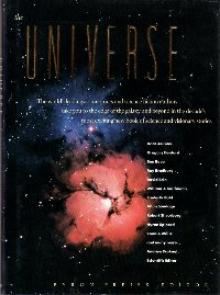 Schwarzschild Radius
Schwarzschild Radius Even the Queen
Even the Queen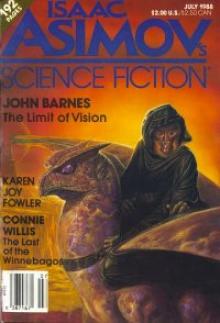 The Last of the Winnebagos
The Last of the Winnebagos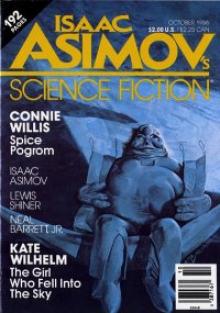 Spice Pogrom
Spice Pogrom Oxford Time Travel 1 - Blackout
Oxford Time Travel 1 - Blackout At The Rialto
At The Rialto A Lot Like Christmas
A Lot Like Christmas